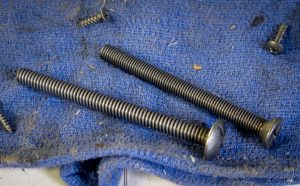We may receive a commission when you use our affiliate links. However, this does not impact our recommendations.
Sorry zinc, I am not attracted to you. Yes, you keep the elements at bay, but your non-stop shiny countenance is irritating. It looks out of place on my traditional projects. And you do not age well.
Zinc, it’s over. I’m going to go get me a stripper.
</stupidliteraryexercise>
There are lots of ways to strip zinc, but most of them (fire, hydrogen chloride) are toxic or have an element of danger. Not so with citric acid. This weak organic acid is safe enough to dunk your hands into (though you will feel a sting if you have any open cuts). It’s safe enough to pour down the drain. And it’s fairly cheap. (It also can strip rust from your old tools.)
It’s easy to use. Take a bucket and pour enough water in there to cover your hardware. Pour about 1/2 cup of the citric acid powder in there for starters and stir the hardware and powder up. Wait a few minutes to see if the reaction begins. After 10 minutes you should start to see significant bubbling. If not, add a little more acid.
It takes about 30 minutes to strip the zinc off fasteners, which have a thin coating. Hinges usually take a little longer. And stuff that is intended for heavy-duty outdoor use can take overnight.
When the zinc is gone, remove the hardware and dry it. I shoot it with a little WD-40 or some oil. Pour the citric acid solution down the drain and you are done.
I used this process on the hardware for the home-center tool chest I built for an upcoming DVD with Popular Woodworking Magazine. Read about that here. Want to read about my experiments with hydrogen chloride as a stripper? Click here.
— Christopher Schwarz
P.S. The music in the video is Chatham County Line. You can find it at FreeMusicArchive.org.
Here are some supplies and tools we find essential in our everyday work around the shop. We may receive a commission from sales referred by our links; however, we have carefully selected these products for their usefulness and quality.









It’ll go even faster if you toss in a penny. Copper catalyzes the reaction between the acid and zinc. In fact, cut two tiny nicks in the rim of the penny (post 1984) and the zinc core will dissolve leaving a very thin copper shell.
Should work with other acids, including vinegar, but some will take longer (and be potentially safer due to the dispersal of the hydrogen gas).
To add to the caution notes, please perform this operation in a well-ventilated environment. The bubbles you see forming are hydrogen gas…explosive in an enclosed area like a small basement shop. Unless you are stripping massive quantities of hardware, it’s probably not a problem, but people should be aware.
I found the citric acid product as a rosin bed cleaner for water softners. It is dry and stores easily. You might have to experiment with the mixture. I used 1 part dry citric cleaner to 2 parts water.
I have also always used white vinegar. Great tips. Thank you for sharing.
Chris Mobley
http://www.cmobleydesigns.com
:… your non-stop shiny countenance is irritating. It looks out of place on my traditional projects.”
And Phillips and Pozidrive heads do?
Be sure to run a lot of water…if you must “pour it down the drain”. Especially if you have steel or cast iron pipes. I’ve made a lot of money from people who think they can just pour anything down the drain.
I have always used white vinegar to strip zinc from hardware.
I’d be inclined to neutralize the citric acid with a baking soda and water solution, then rinse with clear water, then WD 40. This was something I picked up from journeymen crafts people I worked with at Colonial Williamsburg. Prior to that time I didn’t use the soda water step after using things like citric acid or muriatic acid to clean metal. It was explained to me that acid has a funny way of hanging around and doing things long after you think it’s done. I know jewelry makers who had staining problems with their soldered silver pieces until they found out about using a soda water rinse to neutralize the flux. In the case of hinges, latches and other hardware with nooks and crannies there could be long term unintended consequences, particularly in high humidity conditions. I figure if works for those folks it probably makes sense to do it myself.
What is a good place to look for Citric Acid powder? Is that something I could find at the grocery cleaning isle?
I have always used white vinegar to strip zinc off of hardware.
It bothers me when somebody says just pour it (what ever it is) down the drain. Everybody lives downstream.
I suspect that you never took a Chemistry class. Hydrogen Chloride (HCl) is properly called Hydrochloric Acid. You cannot place your hand in it without severe skin damage. Sometimes called Muratic Acid…
Coke is pretty acidic too (Ph = 2.5), so is vinegar, did you try that ?
The hotter the water the faster the reaction.
So close, but you really want:
That’s the proper syntax for an empty element.
If you’re going to clock your screws, then you really ought to get your pseudo-xml syntax right too 😉